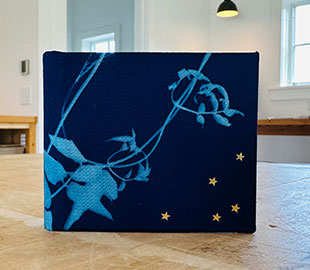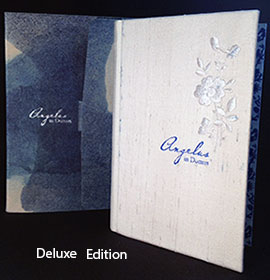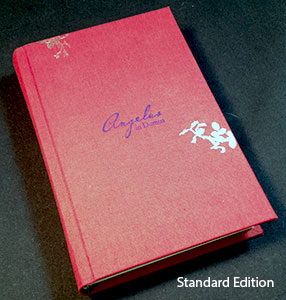Mukti Nurya Cerio ~ New York
(Honey Tree Press)
|
|
| |
|
Cerio is a book artist and binder. She is a graduate of the MFA Book Arts Program at the University of Alabama.
Mukti Nurya Cerio: "My work is molded by my life and each one of these books represents a different part of it. " |
| |
|
Because You Don't Deserve a Big Book
By Mukti Nurya Cerio
Honey Tree Press, 2024. Edition of 25.
Measures 3.25" wide x 2.75" high. Letterpress printed on Johannot paper in Typewriter and Dearest fonts. Cover hand printed cyanotype cloth using plants grown on the artist’s farm with gold hand tooling. Also copies bound in red silk with gold tooling. Endsheets of handmade cotton rag made from artist’s ex-husbands old shirts.
Mukti Cerio: "In 2018 I went through a horrible divorce. My youngest child was under one when my husband left me for another woman. I am telling you this because it rocked me, it was the last thing I expected and it changed the trajectory of my life. I moved my three girls away from New Jersey where we had been living and up to the Hudson Valley. For a long time I thought I lost my ability to create and then I was just so busy picking up the pieces. When I finally emerged on the other side I realized that through all that pain, there is humor and a better life. So this little book which was written right after we moved upstate took me a long time to finally finish. I intentionally made it a small book because it carries a lot of my heart at that time but it is also not all of me. I intentionally made it pretty to look at because it is at its heart a book of revenge and that is not a beautiful thing, necessary sometimes but not pretty to look at. The making of this tiny book is a closing of a chapter in my life and a marker drawn in the sand for the next phase.
“The images use flowers and anatomical drawings to hint at a deeper meaning. I have long been fascinated with Victorian imagery in particular the concept of the language of flowers, known as floriography. I have always been drawn to hidden messages and the thought of sending someone a message with plants was too much to resist. I have used this within the images of the book and the cover decorations to imbue meaning, as well as anatomical imagery inspired by my ex-husband's medical profession."
$350 |

Click image for more |
| |
|
|
| Mukti Nurya Cerio SOLD / Out of Print Titles: |
|
| |
|
Angelus in Domus
By Mukti Nurya Cerio
New York: Honey Tree Press, 2012. Edition of 40.
4 x 6.25"; 158 pages. Printed in the spring of 2012 at the Center for Book Arts in New York. Printed in Centaur and Dearest fonts on Johannot paper using polymer plates. An edition of 40: 30 standard in red cloth-covered boards and 10 deluxe bound in embroidered covers. Laid in four-fold paper portfolio with slip and slot closure.
"The Angel in the House," a narrative poem by Coventry Patmore first published in 1854, was seen by many Victorians to draw a portrait of the ideal woman. Mukti Cerio begs to differ.
Mukti Cerio: "There exists a romantic vision of the Victorians that has taken root in our generation, but this vision hides a far more nefarious time in history. Beyond the well-mannered parlors of the English country home lay a quagmire of filth, iniquity, and sorrow. Disease was rampant, poverty was almost all pervasive, and the explosion of the Industrial Revolution meant that most English laborers spent from dawn till dusk toiling in factories and below the earth in the blackness of the mines. To be poor in Victorian England was a grueling march to death, which included few daily pleasures and almost no respite.
"If this was the life of the English working class, it is inconceivable to contemplate the life of women during this period. If you were lucky enough to be born into a good family your sole purpose in life was to be wed to a suitable husband. Once married, women lost all their land, wealth, and titles and became the property of their husbands; and these unfortunate women were the lucky ones. Consider the countless women who were unable to marry? They quickly joined an invisible class of unwanted old maids who took their place at the edge of the ballroom. They had no home, no income, no status, and worst of all they were blamed for their condition as if it was a choice rather than an infliction. And behind every well-bred young lady, and every kitchen maid, beside every governess, and every matchstick girl, stood the Angel in the House like a ghostly reminder of their own imperfection.
"Angelus in Domus is an artist book that contrasts Coventry Patmore's epic poem 'The Angel in the House,' against facts about women's lives in Victorian England. Patmore's poem came to symbolize the ideal that every woman was expected to bend to. His work was viewed in this manner by his contemporaries and still exists as a by line used to refer to the perfect Victorian woman. The statistical information is all derived from original sources including the 1831 and 1871 census. Throughout the book I have used silhouette images to illustrate the text, which was an art form typically practiced by women during the period. The deluxe edition of the book comes with embroidered covers, embroidery being one of the prized accomplishments of a Victorian lady."
(SOLD/Out of Print) |

Click image for more

Click image for more
|
| |
|
| |
|
Page last update: 11.13.2024
|
